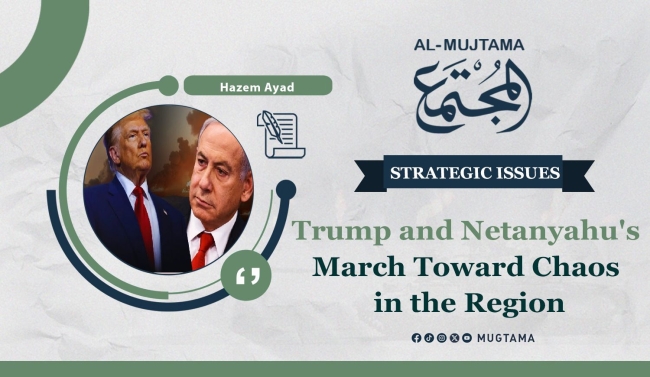Ahead of his meeting with U.S. President Donald Trump, Israeli Prime Minister Netanyahu announced that he was sending a technical delegation to Doha to begin the second phase of negotiations regarding a prisoner exchange deal and a ceasefire to end the aggression against the Gaza Strip.
Middle East Negotiations Moving Forward
The announcement came just hours after Netanyahu met with Trump’s special envoy to the region, Steve Witkoff, who stated following the meeting that Middle East negotiations were moving forward; this referred to negotiations with regional countries, foremost among them Saudi Arabia, which reaffirmed its commitment to a two-state solution during the meeting of the Cairo Six Foreign Ministers.
Regional Reactions
Moreover, Riyadh, along with the foreign ministers of Jordan, Egypt, the United Arab Emirates, and Qatar, directed a message to U.S. Secretary of State Marco Rubio reaffirming their rejection of the displacement of Palestinians from their land in the Gaza Strip and the West Bank. The conflict concerning Trump and influencing his priorities peaked the moment the wanted international criminal terrorist Netanyahu landed in Washington.
Series of High-Level Meetings
The U.S. President’s meeting with Netanyahu on Tuesday, February 4, 2025, will not be the last; it will be followed by a meeting with King Abdullah II in the capital Washington on the following Tuesday (February 11), and then another meeting with Egyptian President Abdel Fattah el-Sisi on Tuesday, February 18. These are intensive meetings that affirm the American president and his advisers and envoys’ efforts to de-escalate tensions and reach a long-term agreement, according to Adam Bowler, Trump’s envoy on prisoner affairs, during an interview he gave on Al Jazeera.
Phase Two of Negotiations
Preparations for the second phase of negotiations and discussions about the day after the war on Gaza began with an "Israeli" request from the American president to ensure that Hamas should not be part of the political scene, and that reconstruction should not be on the negotiating table but rather the displacement of Palestinians—a point emphasized by Bowler and later by Trump during his meeting with Netanyahu in the White House.
Meetings with a Flavor of Escalation and War
The reassurances offered to Netanyahu were not limited to National Security Adviser Mike Waltz, who oversees the Iranian file, and Steve Witkoff, who handles normalizing relations with regional countries; Trump has repeatedly hinted at the need for "Israeli" expansion in his recent discourse about the small size of the entity compared to Middle Eastern countries. He likened the "Israeli" entity to a pen and the Middle East to the table at which he sits in the White House, attempting to highlight the small size of the entity and its need for expansion. He even preceded the meeting with Netanyahu by signing an executive order to intensify sanctions against Iran, knowing that the declared American "Israeli" escalation and greed are precisely what has led to wars and instability in the region.
Tensions and Complications
Trump's meeting with Netanyahu was not free from such statements during and after the meeting; they are Trump’s carrots intended to tighten control over Netanyahu and his coalition government, yet they simultaneously serve as a volatile card, as they raise the level of tension and complicate the political and negotiation scene in Doha and other capitals in the region, particularly Cairo and Amman.
Comfort and Incitement
Trump’s statements bring comfort to Netanyahu and the "Israeli" right, led by Finance Minister Bezalel Smotrich and the resigned minister from the coalition government Itamar Ben Gvir, along with settlement council directors, most prominently Israel Gantz and Yossi Dagan, who were among Trump’s key supporters during his electoral campaign. However, on the other hand, they incite the sentiments of the peoples of the region, their living forces, and states and stir the concern of their leaders.
Also Read: Trump... and the Rise of "Adrenaline"!
Trump's statements and his almost incessant chatter render the "Israeli" entity an existential threat to the Palestinian people, Arab peoples, and the countries and political systems in the Arab region. The candor with which he speaks has reached its peak in folly, greed, arrogance, and misbehavior; it is a reassurance tinged with the flavor of war, raising tensions and threatening to disrupt and sabotage his policies and complicate relations with regional countries, especially those that are partners and friends of the United States.
The March of Fools: From Trump to Netanyahu
Trump's statements chart a foolish course as they satisfy the thirst of the Israeli right and ignite its appetite for war in the Gaza Strip, as well as its greed for annexing the occupied territories of 1967, which it is keen to implement in the West Bank, while tanks of the occupation army reach Lebanon and Quneitra in Syria.
Escalating Tensions
Trump's repeated foolish comments about displacing Palestinians from Gaza and moving them to Jordan and Egypt, along with his hints regarding the "Israeli" entity's need to expand by annexing more land, including areas in the West Bank or potentially in Lebanon and Syria in the future, as well as his announcement of plans to impose maximum sanctions on Iran, escalate tensions in the region and do not contribute to the stability promised by envoy Buller. The only way to implement these policies will be through advancing the march of death and war that Trump seeks to avoid, rather than through negotiation and the deals he discusses.
Warning from History
This very march was warned against by the renowned American historian and writer Barbara Tuchman in her book "The March of Fools: From Troy to Vietnam," where she indicated that leaders with excessive ambition, great greed, and poor judgment, coupled with a fascination with power, often end up failing and leading their nations toward collapse and isolation. This is the foreseeable future of American influence in the Arab region, which is already suffering from immense pressure due to the foolish positions, statements, and actions reiterated by Trump, threatening America's partners and friends in the region before anyone else. This is the same policy that prompted Fidel Castro to open up and ally with the former Soviet Union (now the Russian Federation) after the victory of the Cuban Revolution in 1958.
Continued March of Fools
The march of fools is not limited to the statements of Trump and Netanyahu; it will certainly continue through practical measures and actions on the ground driven by the greed and excessive ambition of Trump and Netanyahu to expand the occupied entity and annex more land to it, which will undoubtedly undermine American influence in the region.
Ambitious Goals and Significant Consequences
What Netanyahu wants is not much different from what Trump desires regarding Iran, the West Bank, and Gaza, which is the eradication of Palestinian resistance, toppling the Iranian nuclear project, and imposing dominance over the Arab region through normalization.
Testing Abilities and Resources
But do they have the ability to do that? Does it only require a statement from Trump for it to happen, or are the resources necessary to achieve this limited and the consequences significant? Is it possible to attack Iran, return to war in Gaza and the Red Sea with the Houthi "Ansar Allah" movement in Yemen, reignite confrontations in the West Bank through displacement and annexation policies, and contain Turkey and Syria while normalizing relations with regional countries? This is what Trump will test during his meetings in Washington over the next three weeks.
Need for Regional Independence
There is no escaping the reality that is starting to emerge; the Arab states need to work on disengaging and reducing their excessive dependence on America, as without this, the region will face further American-Israeli encroachment that will not stop at any borders in the Arab region. The only thing that may halt it in the future is an escalation of resistance over a wider area than what the region has experienced, extending from the Red Sea to the eastern Euphrates and the Mediterranean.


